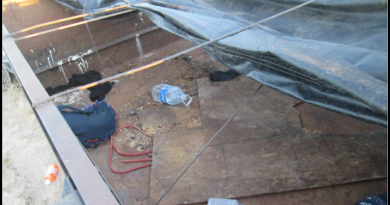Luxury Jewelry, Handbags, Watches & More Worth almost $800K Intercepted by CBP Officers at Chicago’s International Mail Facility
At Chicago O’Hare’s International Mail Branch, U.S. Customs and Border Protection (CBP) officers seized two packages containing 614 pieces of counterfeit designer apparel on July 28. The items were deemed to be counterfeit by CBP’s Centers of Excellence and Expertise, the agency’s trade experts and would have had a combined Manufacturer’s Suggested Retail Price (MSRP) of $795,175, if genuine.
The first shipment was arriving from Thailand. When CBP officers examined the shipment to determine the admissibility of the goods they found 565 pieces of jewelry, handbags and other apparel displaying the logos of Louis Vuitton, Chanel, Gucci, Burberry, Prada, and Van Cleef & Arpels. The items were heading to a residence in Ohio and had the items been real, the MSRP for these products would have been $689,160.
The second shipment CBP seized Friday night was also arriving from Thailand and was heading to a residence in Dallas, Texas. CBP officers examined the shipment to determine the admissibility of the shipment, and discovered the box contained counterfeit jewelry, handbags, watches, caps, and socks displaying the logos of Tiffany and Co., Rolex, Yves St. Laurent, Hermes, Gucci, Louis Vuitton, Chanel, Versace, and Dior. Had these items been real, the MSRP for these items would have been $106,015.
Both shipments were seized for infringing on the designer’s protected trademarks.
“CBP’s detection, identification, and targeting capabilities are world class,” said LaFonda D. Sutton-Burke, Director of Field Operations, Chicago Field Office. “These resources, along with enhanced information sharing and partnerships, are critical components of CBP’s ability to detect and deter the entry of dangerous shipments.
The illicit trafficking of counterfeit goods offers criminals a complementary source of income and a way through which they can launder money. Additionally, monies received from the sale of counterfeit products can be channeled towards the further production of fake goods or other illicit activities. Counterfeiting is a hugely profitable business, with criminals relying on the continued high demand for cheap goods coupled with low production costs.
“This is a great example of the work our officers do to protect consumers and the U.S. economy,” said Chicago’s Acting Area Port Director Michael Pfeiffer. “Our officers continue to use their training, knowledge, and skills to identify high-risk shipments and shut down illicit suppliers.”




